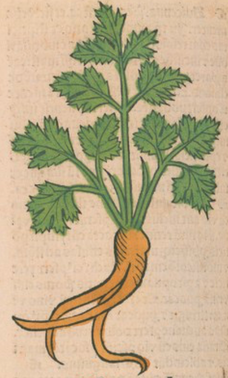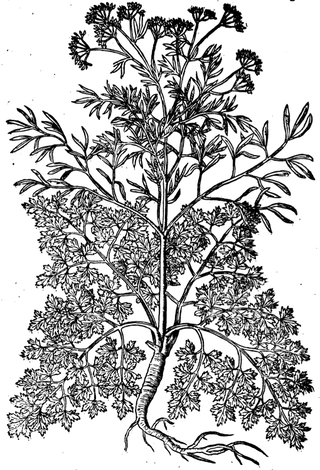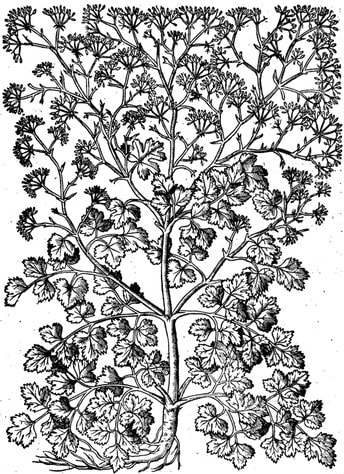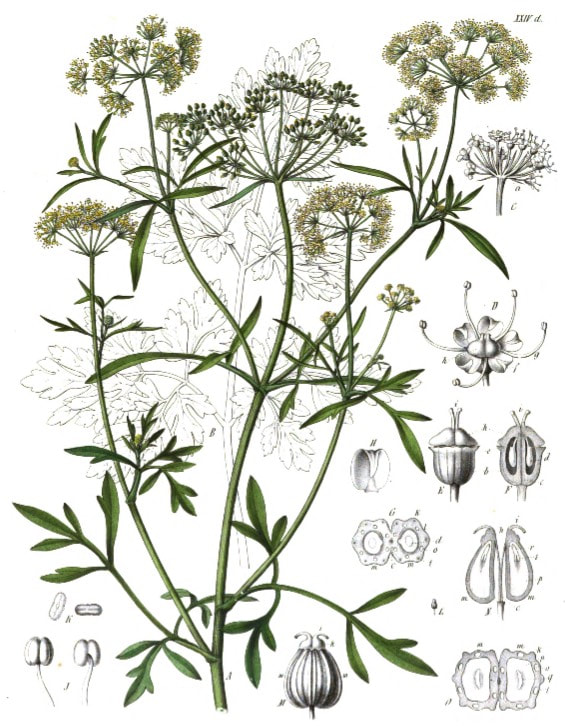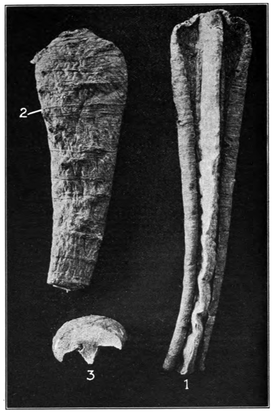Sentry Page Protection
Petroselinum, Parsley
Ortus Sanitatis, Meydenbach, 1491
Darstellung und Beschreibung Pharmacopoea Borussica, Berg, 1861
PARSLEY ROOT
1, Longitudinal section with recurved cortex and ridge of pith. 2. Annulate surface.
3. Transverse section showing round resin cavities.
Squibb's Atlas of the Official Drugs, Mansfield, 1919
1, Longitudinal section with recurved cortex and ridge of pith. 2. Annulate surface.
3. Transverse section showing round resin cavities.
Squibb's Atlas of the Official Drugs, Mansfield, 1919
Botanical name:
Petroselinum spp.
1. Garden Parsley: P. hortense (P. crispum and P. sativum used similarly)
2. Macedonian Parsley: P. macedonicum
3. Stone Parsley: Sison amomum
Parts used:
Root; Seed
Temperature & Taste:
Warm, dry. Pungent, Sweet. Mountain and Macedonian Parsley was regarded as warmest
Classifications:
2D ATTENUATERS OF CONGEALED BLOOD. 2K. RESOLVENT. 2Q. ANODYNE
3A. SUDORIFICS & DIAPHORETICS. 3F. LITHONTRIPTIC. 3G. EMMENAGOGUE. 3H. LACTAGOGUE
4i. UTERINE
Petroselinum spp.
1. Garden Parsley: P. hortense (P. crispum and P. sativum used similarly)
2. Macedonian Parsley: P. macedonicum
3. Stone Parsley: Sison amomum
Parts used:
Root; Seed
Temperature & Taste:
Warm, dry. Pungent, Sweet. Mountain and Macedonian Parsley was regarded as warmest
Classifications:
2D ATTENUATERS OF CONGEALED BLOOD. 2K. RESOLVENT. 2Q. ANODYNE
3A. SUDORIFICS & DIAPHORETICS. 3F. LITHONTRIPTIC. 3G. EMMENAGOGUE. 3H. LACTAGOGUE
4i. UTERINE
Uses:
1. Clears Damp, Warms the Kidneys, Promotes Urine:
-obstructed Urine; difficult, painful or dribbling Urine; Cystitis
-Edema, Prostatitis
-Gravel, Stone of Bladder and Gall Bladder (seed is stronger)
-Gerard said the seeds ‘make thin’.
-seed is used for Rheumatic complaints (similarly to Celery seed)
2. Clears Wind, Phlegm and Damp, Opens Obstructions:
-Root is one of the Opening Roots; opens the Liver and Spleen
-Hepatic; used for Jaundice, Cachexia
-Dizziness, Epilepsy, Migraines, Hypertension, Cachexia, Lethargy
3. Moves Qi, Warms the Kidneys, Promotes Menstruation:
-good for obstructed Menstruation; delayed or painful Menstruation
-Parsley wine was regarded as Aphrodisiac; Parsley was classically used for Infertility
-promotes Birth, cleanses afterbirth; juice has been used to promote Labor
4. Clears Cold Phlegm, Stops Cough:
-opens the Lungs, Coughs, Asthma
5. Resists Poison
-the various Parsley's were used as Alexipharmics (especially seeds)
-Juice was taken at the beginning of the Fit in Intermittent Fevers (3 oz., then go to bed and sweat)
6. Strengthens the Eyesight. (Seed)
7. Externally:
-Black Eyes
-juice dropped into the Eyes it quicken the sight
-applied to stop Falling Hair
-laid on the Breast to stop Milk; ‘Women use it when they wean Children’. (Schroder)
Dose:
Root and Seed can generally be taken in similar doses.
Powder: 1–4 grams
Decoction: 3–9 grams
Of the Juice: 1–3 oz.
Comment:
1. Root is more tonifying and better to open obstructions; it warms and strengthens the Kidneys
2. Seed is warmer, better for Stones, and better to ease Wind, Colic and Pain
3. Macedonian Parsley was regarded as best to promote Menstruation
4. Culpeper said in his time the seeds of Alexander (Smyrnium olisatrum) was usually sold as Macedonian Parsley seed by the Apothecaries.
Root and Seed can generally be taken in similar doses.
Powder: 1–4 grams
Decoction: 3–9 grams
Of the Juice: 1–3 oz.
Comment:
1. Root is more tonifying and better to open obstructions; it warms and strengthens the Kidneys
2. Seed is warmer, better for Stones, and better to ease Wind, Colic and Pain
3. Macedonian Parsley was regarded as best to promote Menstruation
4. Culpeper said in his time the seeds of Alexander (Smyrnium olisatrum) was usually sold as Macedonian Parsley seed by the Apothecaries.
Main Combinations:
Opening Roots - Five & Two
The Root is one of the Opening Roots: '5 Opening Roots’, with Celery, Fennel, Broom, and Asparagus. These were used to open obstructions, especially of the Urinary system. The ‘2 Opening Roots’ are Parsley and Fennel.
Asparagus root & Parsley root
Urinary:
1. Edema:
i. Parsley root with Juniper berry, Restharrow and Licorice (Pharm. Austr. VIII)
ii. with Cinnamon, Asarum, Mastic, Wormwood, Aniseed, Fennel seed, Rhubarb, Indian Spikenard (as in Antidote for Edema)
iii. Parsley seed with Celery seed, Madder, Savin, Asarabacca, Fennel seed, Indian Spikenard, Bitter Almond (as in Pills to Promote Urine)
2. Edema, and for Stones;
i. decoct Parsley herb and Thyme in white wine. (Culpeper)
ii. Parsley seed with Radish seed
iii. Parsley seed, Lapis Judiaicus, Hares Hair burnt (Herbarium Horstianum, 1630)
iv. Parsley seed with Amber, Nettle seed (as in Powder of Lord George of Elt)
v. Seeds of Parsley, Fennel, Annis and Caraway with roots of Parsley, Burnet, Saxifrage, and Caraway (as in Decoction of Parsley, Trogus, 10AD)
3. To cleanse the Kidneys, decoct Parsley root and Pellitory of the Wall.
4. Bladder infections and Gonorrhea, Parsley seed with Uva Ursi and Celandine (Kroeber)
Gynecology, Obstetrics:
5. Infertility, Parsley seed with Broom flower, Celery seed, Cumin, Mugwort, Feverfew (as in Pills Against Barrenness)
6. To promote Menstruation, with Myrrh, Cinnamon, Savin, Celery seed (as in Powder to Promote Menstruation)
7. To promote Labor, Parsley and Leek juice, mixed with a little Oil. (The Secrets of Alexis, 1615)
Liver:
8. Jaundice, decoction of Parsley root, Chicory root (Herbarium Horstianum, 1630)
8. Liver obstruction, roots of Celery, Parsley and Asparagus, with Agrimony, Hyssop, Maidenhair (Riverius)
10. Liver disease, Parsley root, Dandelion, Barberry bark
Other:
11. Melancholy, Parsley seed with Dodder and Aniseed (as in Confection for Melancholy of Galen)
Major Formulas:
Decoction of Parsley Compound
Decoction of Parsley and Thyme
Decoction of Parsley and Radish seed
Syrup of Two Opening Roots
Syrup of Five Opening Roots
Syrup of Mugwort (Augustana)
Stone–Breaking Powder (Lithontripticon) (Nicholas)
Powder of Lord George of Elt (Gabelhover)
Electuary for the Eyes (Grulingus)
Electuary for Back Pain (Galen)
The Queen of Colen’s Electuary
Antidote Suitable for Cough (Nicholas)
Antimoron (Nicholas)
1. Nephritic Powder:
i. Licorice (1 ½ oz.), Parsley root, Fennel root (2 oz. each), Orris (1 ½ oz.), Mallow flowers, Marshmallow flowers, Fennel seed, Saxifrage seed, Jujubes, Figs (30 of each), Pearl Barley (3 oz.); to be decocted (Pharmacopoeia Generalis, 1783)
2. Greater Opening Powder:
i. Herbs of Endive, Chicory, Fumitory (1 handful each), Eupatorium, Borage, Bugloss, Heelweed, Hart's Tongue (½ handful each), Roots of Licorice, Celery, Fnnel, Parsley, Raisins (half ounce each), Aniseed, Fennel seed, Thyme, Dodder, Tamarisk bark, Caper bark (2 drams each), Senna (2 oz.), Polypody (1 oz.), Agaric (half ounce) (Dispensatorium medico pharmaceuticum Palatinatus, 1764)
3. Diuretic Decoction:
i. Parsley root, Fennel root (1 oz. each), Carrot seed, Winter Cherry berries (½ oz.), Spring Water (60 oz.); decoct to 48 ounces, adding towards the end Pellitory of the Wall (1 handful), Raisins (half ounce); strain, and dissolve in Potassium nitrate (2 drams). (Pharmacopoeia Generalis, 1783)
Cautions:
1. Oil or Juice should not be used during Pregnancy.
Main Preparations used:
Distilled Water of the Whole Plant
1. Oil or Juice should not be used during Pregnancy.
Main Preparations used:
Distilled Water of the Whole Plant

